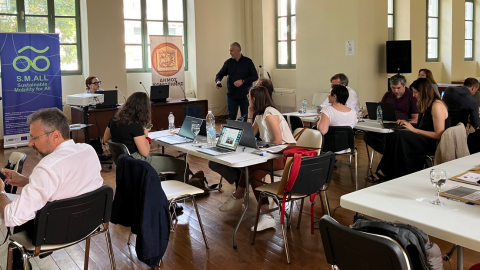Promoting Cycling Mobility: EducaBicla and Metrominuto in Guimarães
One standout initiative, EducaBicla, integrates cycling into school curriculums in Guimarães. As experienced during the Second Transnational Meeting in April 2024, students learn practical cycling skills, traffic rules, and bike maintenance, preparing them for sustainable mobility from a young age. The program also extends to adults, encouraging daily bicycle use for commuting. Upon completing the course, participants earn a cycling license, fostering a culture of eco-friendly transport habits.
How to apply the lessons learned? The Metrominuto project, launched in partnership with Guimarães City Council, champions pedestrian mobility. Inspired by similar efforts in Spain, this visually appealing map outlines walking times between key city landmarks, reducing car dependency and improving air quality. Notably, the map uses the ColorAdd system, ensuring accessibility for color-blind users. This initiative aligns with the city’s broader goals of sustainable urban planning, as highlighted in the Limp.Ar project, funded by Portugal's Ministry of Environment and Climate Action.

Accessibility for All: Lessons from Komotini
In Komotini, the PERPATO association has transformed the city into a benchmark for accessibility, earning it the title of European Access City in 2021. PERPATO’s community-centered initiatives, such as training for independent living and inclusive sports programs, illustrate the power of local collaboration in advancing rights for people with disabilities.
Learn more about PERPATO’s impactful work here.

Key Takeaways for Urban Planners
The S.M.ALL network’s activities highlight critical approaches for fostering inclusivity and sustainability in urban spaces:
- Community Involvement. Early engagement ensures plans reflect diverse needs.
- Education. Initiatives like EducaBicla show the value of teaching sustainable mobility from a young age.
- Equity and Accessibility. Projects like PERPATO and Metrominuto underscore the importance of making cities accessible to all.
- Technology Integration. Tools like mobility matrices and solar-powered monitoring enhance project effectiveness.
- Long-term Vision. Inclusive urban planning thrives on community ownership and adaptive strategies.
The S.M.ALL network confirms its dedication to promoting the effectiveness of a method that interlaces local actions and transnational frameworks to transform urban environments. By prioritizing sustainable and inclusive mobility, the network is paving the way for greener, fairer cities.



